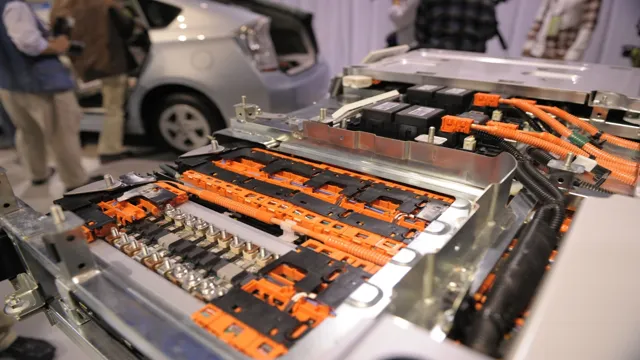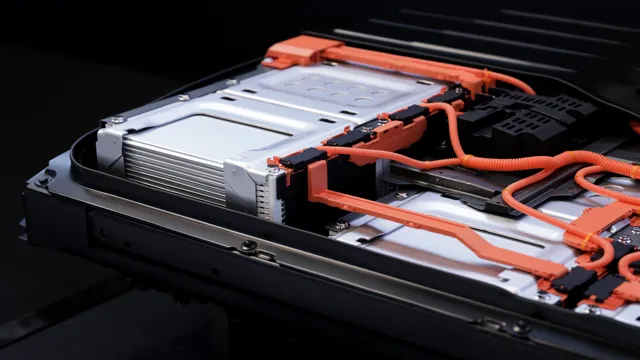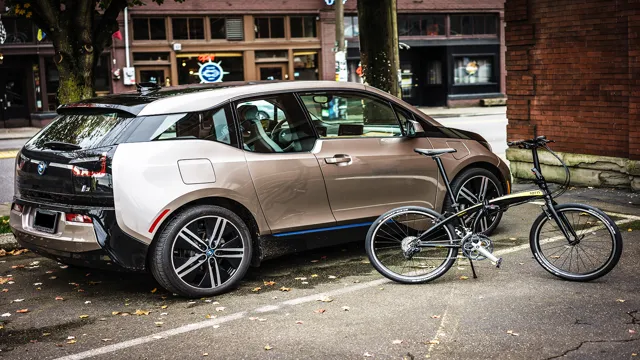Revolutionizing the Roads: The Truth About Electric Car Battery Life
Electric car battery life is a critical factor to consider when buying an electric vehicle. One of the major advantages electric vehicles have over traditional gas-powered vehicles is their low operating costs. However, for the EV to be cost-effective, the battery cells would need to last long enough to justify the initial purchase price.
The battery life of an electric car represents how long the battery can operate before location, terrain, weather, temperature, and car usage affect it. For potential buyers asking themselves how long electric car batteries last, several factors play into determining the service life of the battery. Maintenance of the car, battery temperature and age, and equipment quality all contribute to the battery lifetime.
EVs today are equipped with lithium-ion batteries that have service lives of around 8-10 years, counting on the quality of the battery and how often the car is driven. Taking good care of the battery and operating the car efficiently help extend battery life. Successful battery life for an electric vehicle can mean significant cost savings and environmental impact.
Investing in EV battery technology is a reasonably safe bet for the future, given that it has room for improvements and is continually evolving.
Factors Affecting Battery Life
If you’re considering purchasing an electric car, one of the most important factors to consider is how long the battery will last. The lifespan of an electric car battery is influenced by several factors, such as the temperature in which it operates, the amount of time it spends charging and discharging, and the quality of the battery cells themselves. Hot temperatures can degrade the battery pack faster, so it’s best to avoid leaving your car parked in direct sunlight, especially during the summer months.
Similarly, regularly discharging and recharging the battery can accelerate its wear and tear. On the other hand, choosing a high-quality battery with high energy density and good thermal management can help extend the battery’s lifespan. Ultimately, the length of time your electric car battery will last depends on several variables, but by taking good care of it, you can help ensure it lasts as long as possible.
Driving Habits
When it comes to maintaining the battery life of your car, there are several factors that can come into play. One major factor is your driving habits. If you frequently make short trips and your car is turned on and off frequently, this can put a strain on your battery and shorten its lifespan.
On the other hand, if you regularly take your car on longer drives, this can help to keep your battery charged and extend its life. Additionally, aggressive driving habits such as frequent braking and acceleration can also put extra strain on your battery. By being mindful of your driving habits and making an effort to drive more smoothly, you can help to prolong the life of your car’s battery.
Ultimately, taking a proactive approach to battery maintenance can save you time and money in the long run.

Climate and Temperature
Climate and Temperature When it comes to battery life, climate and temperature play a significant role in determining how long a battery will last. High temperatures can cause batteries to degrade faster, reducing their overall lifespan and causing them to lose charge more quickly. On the other hand, cold temperatures can also impact battery life by reducing its capacity and causing it to drain faster.
Extreme temperature fluctuations can also damage the internal components of a battery, causing it to lose its functionality over time. It’s important to keep your devices at a consistent temperature range to ensure maximum battery life. In short, temperature can have a significant impact on the overall performance of a battery, and it’s important to consider this when choosing a battery for your device.
Battery Size and Type
When it comes to battery life, the size and type of battery you use plays a big role. Generally speaking, larger batteries will have longer lives than smaller ones, but there are many other factors to consider as well. For example, rechargeable batteries may have a shorter lifespan than single-use ones, but they can be recharged multiple times, making them more eco-friendly and cost-effective in the long run.
Additionally, different types of batteries (such as lithium-ion or nickel-metal hydride) have different properties and will perform differently in different circumstances. Ultimately, the best way to ensure a long battery life is to use the right type of battery for your device and to take care of it properly with regular maintenance and careful usage. So next time you’re considering a new battery, think beyond just size and consider the many different factors that can impact its lifespan.
Average Battery Life for Electric Cars
If you’re interested in purchasing an electric car, perhaps you’re wondering how long the battery lasts. Unlike gasoline-powered cars, electric cars run on battery power, and the length of their charge can vary depending on the model and driving conditions. On average, electric car batteries can last anywhere from 50,000 to 200,000 miles before they need to be replaced.
However, this lifespan can also be affected by factors such as weather conditions, how often the car is charged, and the type of terrain it is driven on. It’s also important to note that as technology advances, so do battery capabilities, so newer models of electric cars may have longer-lasting batteries. So, while the average lifespan for electric car batteries may fall within a broad range, it ultimately depends on a variety of factors specific to each individual car.
Tesla Model S
When it comes to the battery life of electric cars, there are quite a few factors to consider. For the Tesla Model S, the average battery life is around 8 years or 150,000 miles. Of course, this can vary based on factors like driving habits, climate, and maintenance.
So, it’s important to take good care of your battery if you want it to last as long as possible. This means avoiding extreme temperatures, charging to only 80% when possible, and keeping your battery cool. Think of it like a plant – give it the right environment and care, and it’ll thrive.
With proper care, the Tesla Model S battery can easily last beyond the 8-year mark.
Nissan Leaf
When it comes to electric cars, one of the main concerns of potential buyers is the battery life. After all, the battery is what powers the vehicle, so it’s essential to know how long it will last before needing to be replaced. The Nissan Leaf is a popular electric car that has been on the market for several years now.
On average, the battery life of the Nissan Leaf is around 100,000 miles. However, this can vary depending on several factors such as driving habits, weather conditions, and battery maintenance. By taking good care of the battery, such as keeping it at a moderate temperature and avoiding frequent charging to 100%, you can extend its life.
It’s also important to note that Nissan offers an 8-year/100,000-mile warranty on the battery, providing peace of mind for buyers. Overall, the Nissan Leaf has a reliable battery life, making it a practical choice for those looking to switch to an electric vehicle.
Chevrolet Bolt
When it comes to electric cars, battery life is one of the biggest concerns that drivers have. After all, no one wants to be stranded on the side of the road with a dead battery. So, what is the average battery life for electric cars? Well, it varies depending on the model.
For example, the Chevrolet Bolt has a battery range of around 238 miles on a full charge. This is above average compared to other electric cars on the market. However, it’s important to keep in mind that there are several factors that can impact battery life, such as weather conditions, driving habits, and age of the battery.
By being mindful of these factors and taking proper care of your electric car’s battery, you can ensure that it lasts as long as possible.
Tips to Extend Battery Life
If you’re wondering how long an electric car battery lasts, it can depend on multiple factors such as usage and maintenance. However, there are ways to extend its lifespan. One tip is to avoid extreme temperatures.
Extreme heat or cold can negatively affect the battery’s performance, so try to park your electric car in a shaded area or garage during hot weather. Additionally, regular charging can help maintain the battery’s health. It’s better to charge your electric car frequently for short periods rather than waiting for it to completely discharge before charging it again.
Finally, avoid aggressive driving and try to drive at a steady speed to conserve the battery’s power. By following these tips, you can help extend the lifespan of your electric car battery and enjoy more miles on the road.
Avoid Frequent Fast Charging
If you’re looking to extend the life of your phone’s battery, one important tip is to avoid frequent fast charging. While it may be tempting to quickly recharge your device to 100% whenever you have a spare moment, doing so can actually harm your battery over time. This is because fast charging generates more heat than regular charging, which can damage the battery’s internal chemistry and ultimately reduce its overall lifespan.
To prevent this, try to charge your phone slowly and consistently, and avoid using fast charging unless it’s absolutely necessary. By taking this simple step, you can help ensure that your phone’s battery lasts as long as possible, saving you time, money, and frustration in the long run.
Keep Battery Charged Between 20% and 80%
As technology improves, our dependence on our devices increases, and as a result, it becomes critical to keep our batteries healthy. One of the simplest ways to keep your battery charged is to ensure it remains between 20% and 80%, as this range can significantly extend the life of your battery. Charging your device up to 100% or using it until it is dead can cause your battery to degrade over time, shortening its lifespan.
Another tip for a healthy battery is to use the charger that comes with your device rather than a generic one, as these can cause damage to your battery. Additionally, keeping your device away from extreme temperatures or direct sunlight can also have a positive effect on your battery’s life. By following these simple guidelines, you can extend the lifespan of your battery and ensure your device remains reliable when you need it most.
Parking in a Shaded Area
When it comes to extending the battery life of your vehicle, parking in a shaded area can make a significant difference. We’ve all experienced the discomfort of getting into a car that has been sitting in direct sunlight for hours, but it’s not just us humans that don’t like the heat – it’s our car batteries too. High temperatures can cause the battery to break down more quickly and can reduce the overall lifespan of the battery.
By parking in a shaded area, you can help keep your battery cool and reduce the risk of it deteriorating prematurely. Additionally, making sure your battery is clean and free of corrosion can also help prolong its lifespan. Using a battery charger or trickle charger on a regular basis can also help keep your battery in top condition and ensure it has the power you need when you need it.
So the next time you’re looking for a parking spot, try to find a shaded area, and your battery (and you) will thank you!
Conclusion: How Long Do Electric Car Batteries Last?
To sum it up, the lifespan of an electric car battery depends on various factors such as the type of battery, quality of manufacturing, usage habits, and environmental conditions. While some may argue that the battery’s limited lifespan may be a disadvantage, it’s important to note that technological advancements are constantly being made to increase battery efficiency and longevity. Plus, with the many benefits of electric cars including reduced emissions and lower maintenance costs, it’s clear that the pros outweigh the cons.
So go ahead, hop in your electric car and drive confidently knowing that your battery will last as long as possible with proper care and attention.”
FAQs
How long does the battery last in an electric car?
The lifespan of an electric car battery varies depending on the make and model of the car, but they typically last between 8-10 years or 100,000 – 200,000 miles before needing replacement.
Can the battery life be extended in an electric car?
Yes, there are a few things you can do to extend the lifespan of your electric car battery such as avoiding fast charging, not fully draining the battery, and keeping the battery at moderate temperatures.
What happens when an electric car’s battery dies?
When an electric car’s battery dies, it will need to be recharged or replaced, depending on the severity of the battery’s depletion. If it’s a minor depletion, the car can be charged, but if it’s a major one, it may require a battery replacement.
How much does it cost to replace an electric car’s battery?
The cost of replacing an electric car’s battery can vary widely depending on the make and model of the car, as well as the size and type of battery needed. On average, it can cost anywhere from $3,000 to $10,000 for a full battery replacement.






